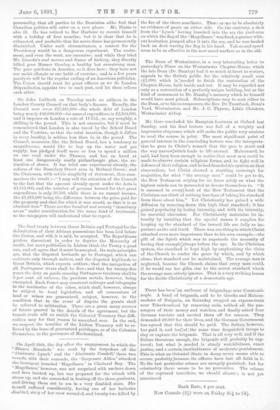Mr. Gore concluded his Bampton Lectures at Oxford last Sunday,
and his final lecture was full of a weighty and impressive eloquence which will make the public very anxious to read the course in print. The most significant point of general interest in the concluding lecture was the interpreta- tion he gave to Christ's remark that the gate is strait and the way narrove2which leads to life eternal. 2tfahomraed, he said, had been keen enough to notice that most men could be made to observe certain religious forms, and to fight well in defence of their religion, and he had founded his system on that observation; but Christ showed a startling contempt for majorities, for what "the average man" could be got to do, the New Testament relying for its force solely on what the highest minds can be persuaded to devote themselves to. "It is assumed in every] book of the New Testament that the Christian can think of nothing less than of taking his standard from those about him." Yet Christianity has gained a wide diffusion by watering-down ibis high ideal standard; it has gained popularity by losing intensity, and with its intensity, its essential character. For Christianity maintains its in- tensity by insisting that the special means it supplies for keeping up the standard of the inward life are fully as im- portant as the end itself. There was one thing to which Christ attached even more importance than to his own example,—the gift of the Spirit which was to supersede the necessity of having that example:ttlways before the eye. In the Christian system, the standard is kept high by emphasising the claim of the Church to confer the grace by which, and by which alone, that standard can' be maintained. The average man is neglected, because the Church claims that every man could, if he would use her gifts, rise to the secret standard which the average man utterly ignores. That is a very striking lesson for the feeble Christianity of a democratic age.






































 Previous page
Previous page